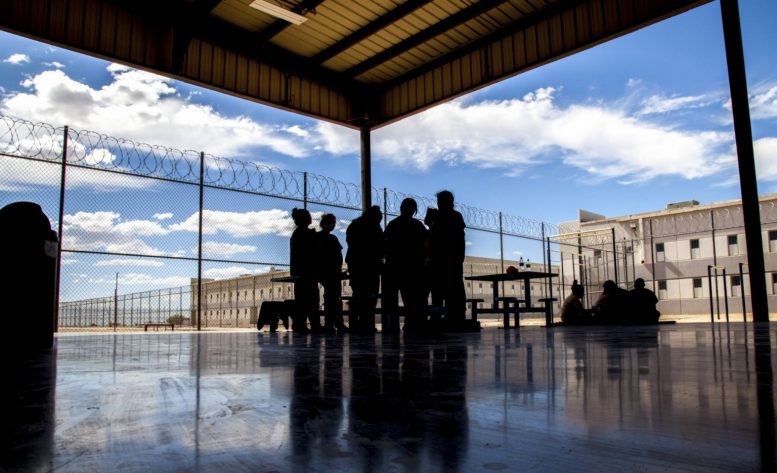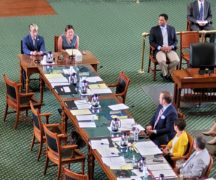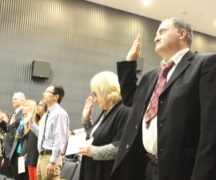By RUTH CONNIFF
via States Newsroom
The collapse of the bipartisan immigration deal Wednesday in the U.S. Senate laid bare the hypocrisy of Republicans who claim border security is their No. 1 concern, yet refused to support the very border security measures they demanded — and Democrats gave them.
Former President Donald Trump warned Republican members of Congress not to give President Joe Biden a political win by passing the bill they had painstakingly negotiated. Trump prefers to campaign against the broken U.S. immigration system. So Republicans agreed to keep it broken for him.
At least Wisconsin Republican Rep. Mike Gallagher refused to perform the extra backflip his GOP colleagues demanded with their failed impeachment of Homeland Security Secretary Alejandro Mayorkas. Mayorkas spent the last few months working with Republicans on the doomed border security measure, which would have been the first comprehensive effort to address the U.S. immigration system passed by Congress in 40 years. Right after they declared the deal dead on arrival, House Republicans tried to pin the entire broken U.S. immigration system on Mayorkas, arguing that he had somehow committed high crimes and misdemeanors by not single-handedly securing the border.
Gallagher acknowledged the absurdity of the charges, but still jumped on the GOP bandwagon to falsely accuse the Biden administration of implementing “open border policies” that helped create “the dangerous crisis at the southern border.”
Republicans are playing political games with immigration. This week they scored a goal on themselves. As Carl Hulse put it in The New York Times, “On the border, Republicans set a trap, then fell into it.” They were unprepared for Democrats to agree to their demands to shut down the border when immigration numbers rise, send back asylum seekers or hold them in detention centers instead of allowing them to live and work in the U.S. while they wait for their cases to be heard, as well as creating a system of quick interviews that would deny asylum hearings and send people back to countries they fled without hope of appeal.
To the dismay of immigrant rights advocates, Biden and Democratic negotiators agreed to all of that.
It was the Republicans who shot down their own plan. And now Biden is campaigning on it.
“Donald Trump has directed MAGA Republicans to kill the toughest and fairest reforms to secure the border in decades because he thinks it will help him politically,” a Biden/Harris campaign email crows. “This bill has picked up support across the political spectrum — including Trump’s allies like the Border Patrol Union, who endorsed Trump’s campaign for president twice — and the Chamber of Commerce.”
What’s missing from the debate
The hypocrisy of anti-immigrant demagoguery goes deeper than Republicans lamenting a crisis they refuse to address. The whole discussion of the threat posed by immigrants and asylum seekers is dangerously distorted.
A big missing piece of the immigration debate is any acknowledgement of U.S. employers’ dependence on immigrant workers, of how productive they are, and of the significant economic contribution they make to the U.S. and to local communities.
On Wednesday, the Immigration Research Initiative released a new national report with state by state data that projects the expected wages, economic growth, and state and local tax contributions from asylum seekers and new immigrants to the United States. In Wisconsin, where about 5% of residents are foreign-born, the report shows that brand new arrivals earn a median wage of $19,730 per year, or almost $40,000 for families with two wage earners — nearly double the federal poverty level. Median wages increase to $37,732 by the time Wisconsin immigrants have been here for five years. The new arrivals to our state pay $2 million in state and local taxes per 1,000 workers. After five years they are paying $4 million in state and local taxes per 1,000 workers.
“Managing large numbers of new arrivals in a short period of time can put a tremendous strain on social support systems that we have both in border states and in cities across the U.S.,” acknowledged Anthony Capote, the report’s author, at a Wednesday press conference. But the good news, he added, is that immigrants quickly climb the economic ladder.
Kathy White, executive director of the Colorado Fiscal Institute, spoke at the same press conference about local officials and nonprofit agencies that have been scrambling to deal with busloads of migrants sent to Democratic cities by Texas Gov. Greg Abbot. Rather than rejecting the new arrivals, White said, communities have simply asked that they not be dropped off without notice in the middle of the night.
“There are immediate, emergency response needs that need to be taken care of and we’re doing it the best way we can with our limited resources,” she said. A less chaotic, more productive approach to immigration is not just more humane, she added. “If we do this right, and stabilize these families, it’s a benefit to us in the long run. … These are people coming with families that can replace an aging workforce. The quicker we stabilize families, the faster they can contribute.”
White’s comments reminded me of the can-do attitude of local officials in Whitewater, Wisconsin. There, despite misleading hype about a small city overwhelmed by a flood of migrants, spread by conservative media outlets and further politicized by U.S. Sen. Ron Johnson, locals have been cheerfully engaged in efforts to help the new immigrants integrate and find jobs, and express a strong sense of their value to the local community and economy.
Immigrants’ contributions
Talk about the “border crisis” ignores that reality, and the reality of U.S. demand for low-wage immigrant workers, especially in Wisconsin’s dairy industry, where more than half of the workers milking cows are immigrants. The entire industry would collapse overnight without this workforce. Yet most of them are undocumented simply because Congress can’t get around to creating a visa for year-round agricultural work so they can get the same protections as seasonal farm workers who pick strawberries and tomatoes.
“Immigrants contribute to the fabric of our communities in ways that make our state better,” says Emily Miota, communications director of Kids Forward, a policy center that advocates for children and families in Wisconsin. “But also, we heavily rely on this foundation to keep our economy and businesses afloat.”
The Migration Policy Institute estimates that about 47,000 undocumented immigrants work and contribute to Wisconsin’s economy, Miota notes, paying at least $100 million in state and local taxes. Yet, she adds, “these parents and caregivers are not eligible for any of the benefits their investments produce. Our neighbors deserve the same dignity, rights, and benefits as the rest of us.”
The worst thing about the political manipulation of immigrants is the way it ignores the humanity of unprotected and easily exploited workers who carry so much of our economy on their backs — many of them after fleeing unimaginable repression and violence in their home countries.
We need a better approach
And that brings me back to the failed bipartisan immigration deal. Whoever benefits politically from that fruitless exercise, its demise is no great loss.
When details of the deal were finally released, Anthony Romero, executive director of the American Civil Liberties Union, among other civil rights advocates, denounced it.
“Eliminating longstanding, core due process protections like court review of asylum cases and doubling down on harmful deterrence and detention policies are not going to get cities and states the support they need,” Romero said in a statement, “nor are they a substitute for policies that would improve border management and address the immigration case backlog.”
After the horrors of the Trump administration’s family separation policy and the ominous increase in violent white-supremacist rhetoric, the last thing we need is a Democratic approach to immigration that features callousness and tough talk.
An honest immigration policy would acknowledge the uncomfortable truth that we rely heavily on the low-paid labor of an insecure, unacknowledged immigrant workforce.
U.S. foreign policy also helps propel migration. Our nation’s complicity in the harm caused by extractive industries and repressive regimes contributes to conditions that make life unbearable in other countries, causing people to risk everything and come here seeking safety.
Climate change, economic exploitation and the rise of brutal, repressive governments will continue to drive mass migrations globally. We need more enlightened policies to create stability, both for us and for the people who are looking to us for something better.





